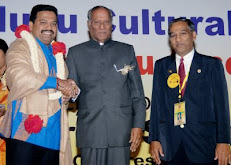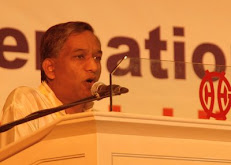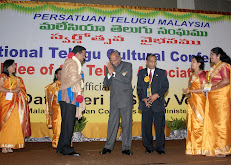Telugu originated from a hypothesized Proto-Dravidian language. Although Telugu belongs to the South-Central Dravidian language subfamily, it is a highly Sanskritized language. As Telugu savant C.P Brown states in page 35 of his book "A Grammar of the Telugu language": "if we ever make any real progress in the language the student will require the aid of the Sanskrit Dictionary, and cannot even talk or write Telugu with any ease or precision, unless he masters the first principles Sanskrit orthography." Inscriptions containing Telugu words dated back to 400 BCE were discovered in Bhattiprolu in Guntur district. English translation of one inscription as reads: “Gift of the slab by venerable Midikilayakha".[8]
Etymology
The etymology of Telugu is not known for certain. It is explained as being derived from trilinga, as in Trilinga Desa, "the country of the three lingas". According to a Hindu legend, Trilinga Desa is the land in between three Shiva temples namely Kaleshwaram, Srisailam and Draksharamam. Trilinga Desa forms the traditional boundaries of the Telugu region.The people who lived in these regions were also referred to as Telaga Caste seems to have been derived from Trilinga Desam. Other forms of the word, such as Telunga, Telinga, Telangana and Tenunga were also seen. It is also said that Trilinga, in the form "Triliggon" occurs in Ptolemy as the name of a locality to the east of the Ganga river. Other scholars compare Trilinga with other local names mentioned by Pliny, such as Bolingae, Maccocalingae, and Modogalingam. The latter name is given as that of an island in the Ganges. A.D. Campbell, in the introduction to his Telugu grammar, suggested that Modogalingam may be explained as a Telugu translation of Trilingam, and compared the first part of the word modoga, with mUDuga, a poetical form for Telugu mUDu, three. Bishop Caldwell, on the other hand, explained Modogalingam as representing a Telugu mUDugalingam, the three Kalingas, a local name which occurs in Sanskrit inscriptions and one of the Puranas.
Kalinga occurs in the Ashoka Inscriptions, and in the form Kling, it has become, in the Malay country, the common word for the people of Continental India.
According to K.L. Ranjanam, the word is derived from talaing, who were chiefs who conquered the Andhra region. M.R. Shastri is of the opinion that it is from telunga, an amalgamation of the Gondi words telu, meaning "white", and the pluralization -unga, probably referring to white or fair-skinned people. According to G.J. Somayaji, ten- refers to "south" in Proto-Dravidian, and the word could be derived from tenungu meaning "people of the South".[citation needed]
The ancient name for Telugu land seems to be telinga/telanga desa. It seems probable that the base of this word is teli, and that -nga, or gu is the common Dravidian formative element. A base teli occurs in Telugu (teli meaning "bright" and teliyuTa meaning "to perceive"). However, this etymology is contested. Telugu pandits commonly state Tenugu to be the proper form of the word, and explain this as the ‘mellifluous language’ from tene or honey. However, this claim does not appear to be supported by scholarly opinion. The renunciation[clarification needed] of the name of the language; 'Telugu' is a British legacy that still clings on in the print media. In fact, many of the 'Thelugu' words referred below in this article have to be rewritten to differentiate between 't' and 'th', and similarly 'd' and 'dh' sounds; otherwise some words mean either funny stuff, or a completely different meaning than what an intended word represents, or offensive.
According to K.L. Ranjanam, the word is derived from talaing, who were chiefs who conquered the Andhra region. M.R. Shastri is of the opinion that it is from telunga, an amalgamation of the Gondi words telu, meaning "white", and the pluralization -unga, probably referring to white or fair-skinned people. According to G.J. Somayaji, ten- refers to "south" in Proto-Dravidian, and the word could be derived from tenungu meaning "people of the South".[citation needed]
The ancient name for Telugu land seems to be telinga/telanga desa. It seems probable that the base of this word is teli, and that -nga, or gu is the common Dravidian formative element. A base teli occurs in Telugu (teli meaning "bright" and teliyuTa meaning "to perceive"). However, this etymology is contested. Telugu pandits commonly state Tenugu to be the proper form of the word, and explain this as the ‘mellifluous language’ from tene or honey. However, this claim does not appear to be supported by scholarly opinion. The renunciation[clarification needed] of the name of the language; 'Telugu' is a British legacy that still clings on in the print media. In fact, many of the 'Thelugu' words referred below in this article have to be rewritten to differentiate between 't' and 'th', and similarly 'd' and 'dh' sounds; otherwise some words mean either funny stuff, or a completely different meaning than what an intended word represents, or offensive.
Ref: en.wikipedia.org/wiki/ Telugu Language
In 1981, then it was Andhra Association of Malaysia wrote to the Malaysian government not to change the name of the place called Tanjung Kling in Malacca as it links with Telugu history and to date, it is still known asTanjung Kling.
In 2004, Telugu leaders like Sri MD Somunaidu, ME Maniam, Ramulu, A.Appalanaidu and I then the General Secretary of Telugu Association of Malaysia made some persentation with document evidence to Director of Dewan Bahasa dan Pustaka, K. Lumpur as there was some confussion about meaning of the word Keling.
After which, in the fourth edition of Kamus Dewan Page 719 - it reads as follows: Keling - sebuah empayar di pantai Coromandel Semenanjung India, yg disebut Kalinga dan Telingana, yg terkenal dgn pelayar atau pedagang yg datang ke Asia Tenggara seawal abad ke-3 so on.



.jpg)
.jpg)
.jpg)
.jpg)
.jpg)


No comments:
Post a Comment